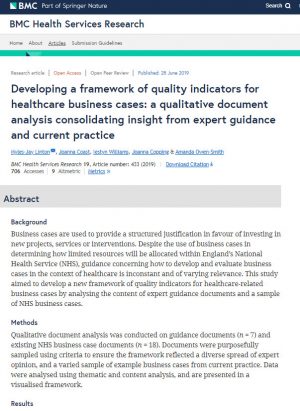Improving the quality of business cases in healthcare
To decide which projects, services or new ideas should be funded, decision makers rely on business cases. With demands on healthcare increasing and limited money to spend, efficient decision making is more important than ever. This is especially true within the NHS Clinical Commissioning Groups (CCGs) who plan and buy health services for local people across England.
Project aims
The aim of the project was to develop guidance on how to write and assess the quality of business cases used in healthcare. Combining expert advice and examples of existing practice helped us to come up with new guidelines for making business cases.
What we did
We collected published and unpublished academic and expert guidance on how to develop business cases. We also collected examples of successful and unsuccessfully funded business cases in CCG decision making between 2014 and 2017. Business cases described new programmes in a variety of clinical areas including mental health, emergency care and end-of-life care. We then took an in-depth look at whether there were common themes in the advice given by experts and the content within existing business cases.
How we involved people
We worked with people from clinical commissioning groups and local government.
What we found and what this means
Across the business cases we looked at, high quality business cases had a clear and well-developed explanation of the following key points: purpose, strategic priorities, options, risks, costs, benefits and evaluation.
As well as describing the proposed idea, good business cases should: be linked to policy aims (local, national or international), take account of risks that could stop plans being successfully implemented, and set out plans for how to check if things are working well over time.
What next?
We have created a framework to support those writing or assessing the quality of business cases in healthcare. We hope to conduct research with others in future to find out how tools like this can improve and support the work of healthcare decision makers.
Paper

Developing a framework of quality indicators for healthcare business cases: a qualitative document analysis consolidating insight from expert guidance and current practice
Read the paperLead collaborators
- Dr Myles-Jay Linton, University of Bristol
- Dr Amanda Owen-Smith, University of Bristol